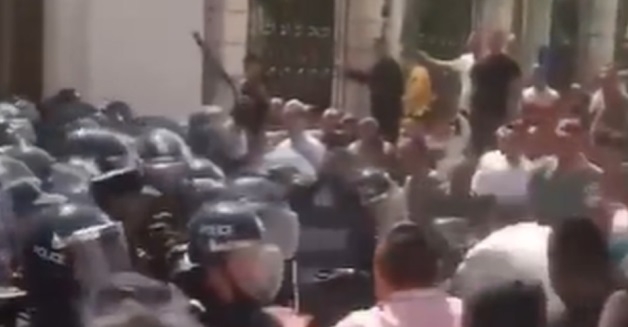The incident is related to a court judgment from 2020 that ruled some of the mosque’s most recent renovations were illegal and ordered demolition…reports Asian Lite News
Clashes broke out between Chinese Police and people in a Muslim-Majority town in southwestern China as protestors tried to stop the cops from demolishing a domed roof of the centuries-old Najiaying Mosque, Washington Post reported.
On Saturday, dozens of officers got into a clash with a crowd as they pushed toward the gate of the Najiaying Mosque, an important seat of worship and religious teaching for ethnically Hui Muslims in Yunnan province, according to videos viral on Twitter. Videos viral on Twitter showed that police had retreated from the area while demonstrators staged a sit-in outside the gate that continued through the night. Dozens of officers from the armed police arrived on Sunday.
The incident is related to a court judgment from 2020 that ruled some of the mosque’s most recent renovations were illegal and ordered demolition, Washington Post reported.
On Sunday, Tonghai County Police labelled the incident “seriously harmful to orderly social management” and urged anyone involved to surrender themselves to law enforcement before June 6 for a chance at a lighter punishment.
The 13th-century Najiaying Mosque was expanded many times over the years to add buildings, as well as four minarets and a domed roof. In 2019, part of the structure was listed as a protected cultural relic.
In recent years, however, Communist Party restrictions on religions have escalated. The country’s top leader, Xi Jinping, has demanded absolute political loyalty of faith communities and the “Sinicization” of religion.
Surveillance of religious leaders has also intensified. This month, a nationwide database of officially approved Islamic, Protestant and Catholic religious teachers was launched, Washington Post reported.
The campaign has focused on Islam and Christianity because of the party’s deep-seated fear of faith being a vector for foreign influence. As well as restricting international exchanges and donations, authorities have remodelled religious buildings whose outward appearance was deemed insufficiently Chinese.
Xinjiang, a northwestern region that was home to millions of Turkic-language-speaking Uyghur Muslims, was hit the hardest.
There, the Sinicization push was combined with a “deradicalization” program of mass detention and reeducation, which the United Nations ruled last year may amount to crimes against humanity. Estimates of the number of mosques and shrines destroyed in the region reach into the thousands.
Unlike in Xinjiang, the Mandarin Chinese-speaking Hui minority originally avoided similarly severe restrictions. But eventually, the crackdown spread to Islamic communities across the country’s northwest, including to Hui in Qinghai.
Situated in an ethnically diverse and remote region of China, the Hui of Yunnan are among the last to face scrutiny. The region is often held up as an example of an ethnically and religiously diverse place, where residents are adept at navigating various identities and being politically flexible when necessary, Washington Post reported.
On Monday, as news of the unrest spread, nationalist commentators urged a forceful response. On microblog Weibo, Xi Wuyi, an influential Marxist scholar at the Chinese Academy of Social Sciences known for her hard-line stance against religious expression, called for “zero tolerance” of what she labelled criminal activities. (ANI)

Leave a Reply